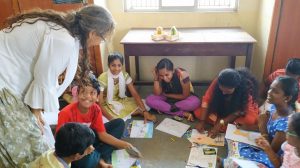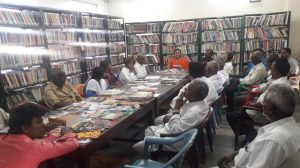How do you become a change agent in your community reaching people of all ages including differently abled, and many others who need support and information? The answer: be a library innovator. Setting an example as a community trailblazer is Mr A Sairam, librarian of the Tiruvannamalai District Central public library in Tamil Nadu – who has literally moved the boundaries of the four walls reaching out to his community in multiple ways.
As an Innovator, Sairam is a part of the INELI India and South Asia programme. This initiative aims to build a network of public librarian as innovative leaders, transforming public libraries as knowledge and life-long learning hubs, striving to build stronger, inclusive and resilient communities.

“We have given different colors to our library…eager to change it, not only as a reading place but a knowledge transforming centre. As an INELIAN we have changed the lives of many people from students to jobseekers, women readers’ forum to school children – many success stories have emerged. We are transforming our library, not only as a reading place, but transforming people’s lives, as a librarian and a changemaker.”
Innovations in this library including multiple knowledge and skill based services such as coaching for government service and civil services exams with government resource persons; space for differently abled such as ramps and Braille books, vocational training in the library space, plant clinics for farmers, health services and a women’s forum to encourage more women readers were included. Also issue-based learning such as on climate change, picture-based learning and encouraging children more into reading besides vocation courses for school and college students. The services are delivered based on local needs and is also aligned with the sustainable development goals.
Since Tiruvannamalai is a District Central Library, it has far better resources compared to a village or taluk library including the availability of IT tools and skilled staff. However, government public libraries do not have specific budgets for outreach community services. This is something that librarians like Sairam build with a network of stakeholders, with support from local philanthropic groups, patrons and communities. He also networked actively with services linked to the government in entitlements and access to information. This approach has helped the librarians repurpose libraries for social development.

One such innovation that moved beyond the library walls is improving good health and well being of children. Knowing there is growing concerns of anemia in this region, Sairam spearheaded anemia awareness, care and prevention. Over 2000 students were screened in tie-up with government doctors, a Rotary club and a local patron. Many children were found to be anemic and after a year of intervention with parents, teachers and students, the numbers who were anemic dropped to 10%. Says the headmaster of the government school, Mr Y Jayaraj Samuel, “It’s really creditable that the district librarian has developed this initiative and through this has helped save the girls’ health and future.”
Says Ms Shivanya, a transgender who is using the library services regularly, “He is encouraging us and helping us to study. It is difficult as it is being a transgender, but he says you must study well and get a job when you leave from here. All support and help me.”
Moving ahead, Sairam has many more plans to increase the role of the library and innovative services, is keen on building a network of services that can bridge the gap between the state libraries and with the South Asian librarians as well – that he feels is the way to not just be a library service provider, but as a change agent, transforming the society around.
Written by: Jayashree B
Inputs and editing: Priyanka Mohan, Roja Rani

